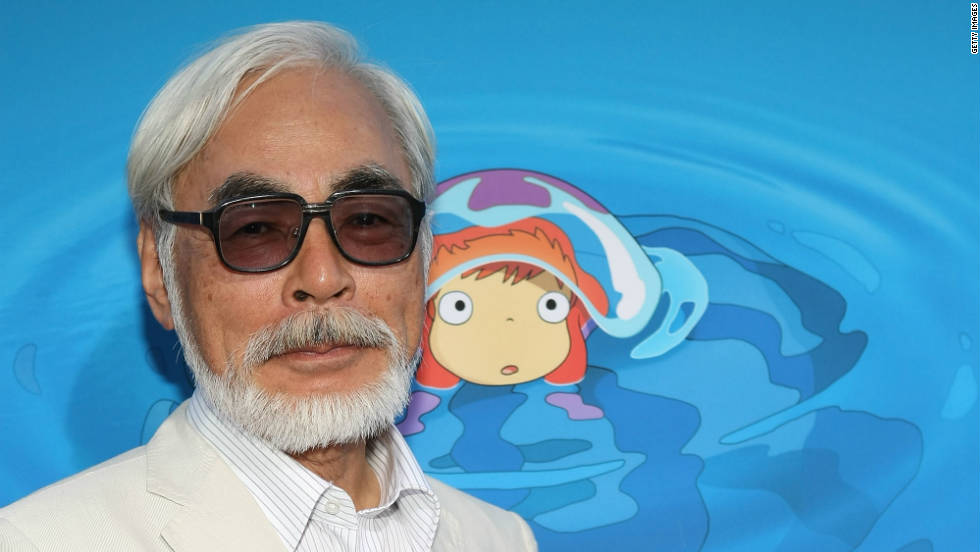Animator Hayao Miyazaki slams Japan's Abe ahead of controversial security vote
As Japanese lawmakers debate a controversial security bill, one of the country's leading artists has characterized Prime Minister Shinzo Abe's desire to reinterpret the constitution as vainglorious and "despicable."
The controversial bill would allow Japanese Self-Defense Force (SDF) personnel to play a greater military role overseas -- something it has eschewed since the end of World War II.
"I presume that PM Abe wants to leave his name in history as a great man who changed the interpretation the constitution. But I think it's despicable," animator and director Hayao Miyazaki told a press conference held at his studio in western Tokyo Monday.
The bill is poised to be voted on by Japan's parliament later this week.
Miyazaki's last feature-length film, "The Wind Rises," is widely regarded as a confirmation of his anti-war politics. It follows the life of the inventor of the Mitsubishi Zero, one of Japan's key fighter planes during the Second World War.
When asked about Japan's current-day military exports, the animator, director and former studio head said the current state was "a very unfortunate development."
Paving the way for constitutional change
This vote would provide a legal framework for a much more liberal reading of the constitution, allowing the government to enable "collective defense," and a more active role for Japanese troops overseas.
Last year, Abe sanctioned a "reinterpretation" of the document to allow for Japanese involvement in the defense of its allies, a move that was greeted withwidespread protests across Japan.
Opponents say the bill will pave the way to a legal framework allowing Abe to wield far greater military power overseas. and may itself be unconstitutional.
"We are very much concerned about the bill, it's content and the way its been proposed," Yukihisa Fujita, a Japan Diet Upper House representative and the Director of the International Bureau of Japan's main opposition party, the Democratic Party of Japan (DPJ), told CNN.
"The govt changed the interpretation of the constitution last year, which in itself is against the constitution. 200-300 experts have said that this is unconstitutional."
Fujita said that a move away from Japan's postwar pacifist stance would damage its standing in the region and internationally.
"For the last 70 years Japan has been known as a pacifist nation, it hasn't sent troops outside (of the country) expect in humanitarian roles. This (proposed change) is against the way our security policy has been set up, it will damage the way Japanese people and country is viewed. It will damage the view of Japanese as a diplomatic nation."
Time to vote
Despite widespread public dissatisfaction with the bill, Chief Cabinet Secretary Yoshihide Suga said the time for debate was over.
"The government's basic policy is to continue explaining attentively over the bills and the timing of the voting is subject to the decision by the parliament. Having said that, it is necessary to make the final decision."
Abe's tinkering remains unpopular and the run-up to this week's vote in the DIet, Japan's parliament, has seen his popularity take a nosedive, according to local media polls. It is a rare dip into negative territory -- only 41% of those polled support his cabinet, as opposed to 43% who disapprove.
Voters are also dissatisfied with plans for a $2 billion stadium, proposed as a centerpiece for the 2020 Olympic Games, which will be held in Tokyo.
Shadow of WW2 looms
The controversial vote also comes only weeks before the 70th anniversary of the end of the Second World War. Politicians and leading figures, including Miyazaki and Fujita, are hoping that Abe uses the occasion to apologize to neighboring countries, most notably China and South Korea, for atrocities committed during the war.
Miyazaki referred to Japan's actions in China as a "war of aggression" and said that Abe's government should unequivocally acknowledge that Japan "inflicted enormous damage on China and express deep remorse over it."
The legendary animator, who officially retired last year, is currently working with an activist group, the Henoko Fund, which seeks to block the construction of a new U.S. military base in Okinawa, Japan's southernmost prefecture. He says the demilitarization of Okinawa is crucial to a peaceful East Asia in the future.
The 74-year old, who seems to have slowed down his creative output only marginally since his retirement last year, is currently working on a computer-animated short for his museum -- a rapid departure from his studio's distinctive, hand-drawn style. He said that since retirement, he "gets to work 30 minutes later than usual, and leaves 30 minutes earlier. That's the only difference."
Studio Ghibli's "Spirited Away," which won the Academy Award for Best Animated Feature Film in 2003, remains the top-grossing Japanese film in history, and Miyazaki, who co-founded the studio in 1985, has been called "Japan's Walt Disney" for his impact on the country's animation culture.
News Courtesy: www.cnn.com











